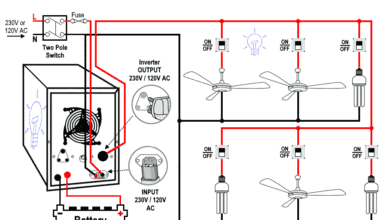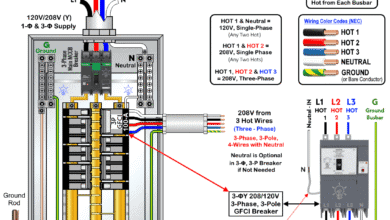Will I Get an Electric Shock If I Touch the Ground Wire?
Is It Harmful to Touch the Grounding Wire?
What is the Ground Wire?
A ground wire, also known as an earth wire or grounding wire, is a wire in an electrical system that provides a safe path for electric current to flow into the ground. It is typically connected to the earthing / grounding system of a building or structure and is used to prevent electric shock and protect electrical equipment from damage in the event of a fault.
Ground wire is bonded to the neutral bar in the main panel (as well as the supply source, e.g., transformer, substation, etc.). For safety purposes, all the external metallic parts of a machine and device are connected to the ground rod via a ground wire. In the case of a fault (when a live, hot, or phase line makes contact with the external body of the equipment), the leakage fault current will safely flow back to the ground. In such circumstances, if a person makes contact with the external part of the machine, they won’t get an electric shock due to the proper grounding and earthing system.
Ground wires are often made of copper and are typically colored green or bare. They are an essential component of electrical systems, helping to ensure the safety and proper functioning of the system.
Related Posts:
Good to know:
- Ground wire is denoted by “G = Ground”, “E = Earth”, “PE = Protective Earth’ and ” PG = Protective Ground”.
- Special protective devices such as GFCI or RCD (RCCB) are used against the ground faults and leakage current protection.
Under normal circumstances, touching a ground wire should not give you an electric shock. The ground wire is designed to provide a safe path for electric current to flow into the ground in the event of a fault, such as a short circuit.
However, if there is a fault in the electrical system and the ground wire becomes energized, there is a risk of electric shock if you touch it. It’s always best to exercise caution around electrical systems and to seek the assistance of a licensed electrician if you suspect any issues. That’s why you should not touch the ground wire under any circumstances unless you are a qualified electrician or trained professional.
Related Posts:
- Can the Neutral Wire Cause Electric Shock? Different Cases
- Will a Man Get an Electric Shock If He Hangs on a Live Wire?
When Does the Grounding / Earthing Wire Becomes Dangerous to Touch?
The neutral wire in a typical electrical circuit is designed to carry current back to the electrical panel from the outlet. Under normal circumstances, the neutral wire should not give an electric shock, as it carries current at approximately 0 volts. However, there are situations where the neutral wire could become dangerous:
- Faulty Wiring: If there is a fault in the electrical wiring, the neutral wire could become energized and carry a voltage. This can happen if the neutral wire is improperly connected (because the neutral wire is bonded to the ground) or damaged, leading to a potential shock hazard.
- Ground Fault: In a ground fault situation, current from the hot wire can flow through the neutral wire back to the electrical panel. In case of fault when the Live wire makes a contact with the external body of the machine, the fault current flows back to the earth via ground wire. This can occur if there is a fault in an appliance or device connected to the circuit, causing the neutral or ground wire to become energized. If the circuit is not ground fault protected and you touch the ground wire, you may feel a shock due to leakage current.
- Reverse Polarity: If the wiring is incorrectly installed, the neutral wire could become energized with voltage, posing a shock hazard. This is more common in older homes or in DIY electrical work where wiring mistakes are made.
- Absence of RCD/GFCI: In the case of a fault where the circuit is not protected by an RCD or GFCI, and the neutral is broken, the fault current will flow through a person’s body if they touch the ground wire. This is because the purpose of the ground wire is to safely redirect fault current to the ground.
- High Voltage Circuits: Making contact with the ground wire in a residential application may cause a harmless shock, but in the case of high-voltage circuits, it can be harmful and potentially severe which may lead to serious injury and hazards, especially in the event of faults.
In these situations, it is important to have a qualified electrician inspect and repair the wiring to ensure it is safe. If you suspect a problem with the neutral wire or any other electrical wiring, it is best to seek professional help to avoid the risk of electric shock or fire.
Never Ever Touch Any Wire Under Any CircumstancesGood to Know
Related Posts:
- Why Earth Pin is Thicker and Longer in a 3-Pin Plug?
- What are the Colored Aerial Marker Balls on Power Lines For?
- Which One Kills ? Current or Voltage and Why? Amps vs Volts
- Which One is More Dangerous? 120V or 230V and Why?
- AC or DC ? Which One is More Dangerous And Why ?
- Which One is More Dangerous? 50Hz or 60Hz in 120V/230V & Why?
- Electrical Shock Hazards & Its Effects on Human Body
- Protective Actions to Avoid & to Reduce Electric Hazardous
- Personal Protective Equipment (PPE) for Electrical Works







